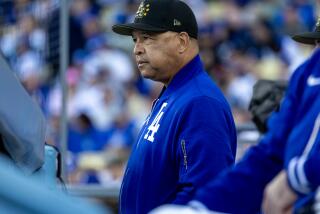Q & A With Peter Ueberroth : Aspects of Feb. 28 Drug Ruling Are Addressed
- Share via
NEW YORK — In the minds of many, the Feb. 28 drug ruling involving 21 major league baseball players, 11 of whom were threatened by suspension, and imposed by Commissioner Peter Ueberroth remains a mystery.
Why hasn’t there been more public notification of which drug-rehabilitation centers will receive the fines/donations from the players? Are they fines? Or donations? Have the players paid them? How have they done so? When and where will they do their public service work? And so on. . . .
The Times, in an attempt to get some answers, submitted a list of questions in writing to Ueberroth and also interviewed him. Some of Ueberroth’s statements on the matter:
“The reason I’ve stayed fairly quiet on these things, and will continue to do so, are twofold. First, I said I would make this ruling and then put this thing behind us and get on with baseball. And second, I told the players’ association that I would stay quiet so that everyone could work together to get a total agreement (on a drug policy).
” . . . This can only be a lose-lose situation if you talk about it. That’s why, if you notice, I made the announcement on a Friday afternoon, fairly late. There are no morning network TV shows the next day. And the Saturday newspapers are the least-read of the week. Before I announced the decision, I said I was going to do it, get it behind us and not talk about it afterward.
” . . . On when and where the charity work is done by the players, I want that to be a private matter for them.
“For example, you’ve got Enos Cabell out there with the Dodgers. Well, if he’s left alone to do it, he will get more out of it. He might be proud of it, get more involved. But if it is publicized, is something he has to do under everybody’s watchful eye, then it won’t be a good experience. You see, I’m interested in what is best for these players.”
The following questions, submitted by The Times, were answered by Ed Durso, a legal counsel for major league baseball:
Question: In the wake of your drug ruling, how will the money be collected from the players? Or has it already been? If it hasn’t been, will it be done so in one lump sum or through payroll deductions?
Answer: We’ve asked each player to supply us with the identity of an appropriate beneficiary. We’d like each to make his donation directly to the beneficiary, while providing us with satisfactory evidence of the donation. If a player doesn’t do so, we can exercise our option of withholding the donation from his salary. This process is ongoing, and the details of each can vary slightly.
Q: Will the baseball commissioner’s office play a role in the selection of the charity that the penalized players will serve? Will the time they put in at these places be closely monitored by baseball and, if so, how?
A: As mentioned above, we’re asking each to suggest an appropriate program that is consistent with our requirement that they make a meaningful commitment to an appropriate drug rehabilitation program. We’re prepared to work with each player in the selection process, in those cases where our help is requested or if the program chosen is not appropriate.
Q: How much thought was given to the IRS consideration before you made the ruling? And has there been considerable confusion and controversy in the aftermath of your ruling as to how the players’ fines/donations will be dealt with by the IRS?
A: The tax consequence to individual players was impossible for us to determine and was not a material factor in deciding the percentage amount we established.
While there have been questions raised about tax liability, there have been no definitive answers. It is up to the IRS to make those decisions.
Since the maximum permissible fine the commissioner can levy on a player is $500, we decided our best alternative was to give the player a choice and the option to continue his career uninterrupted. That option included the donation.
Q: What is the status of the union grievance hearings, which so many of the players with drug-testing clauses in their contracts are counting on to make the clause void?
A: We’ve had five days of hearings and will probably have at least two more during the second half of this month. There will probably be briefs filed in June, and it won’t be until mid-June--at the earliest--that we expect a judgment to be rendered.
Q: How much will the public be informed about the players’ participation in charity programs and where their money will be contributed? Will there be a formal announcement of all these activities some day?
A: Whether or not the information becomes available will be on a case-by-case basis. We’re amenable to players who choose to do the lion’s share of their charity work in the off-season and, if they desire, as privately as possible.
We will not be issuing press releases every time a player does charity work. On the contrary, we will not interfere with those players who wish to go public with their charity programs.
More to Read
Are you a true-blue fan?
Get our Dodgers Dugout newsletter for insights, news and much more.
You may occasionally receive promotional content from the Los Angeles Times.










